2023年中考英语复习 九年级 Units 1-3课件(共43张PPT)
文档属性
| 名称 | 2023年中考英语复习 九年级 Units 1-3课件(共43张PPT) |  | |
| 格式 | ppt | ||
| 文件大小 | 2.1MB | ||
| 资源类型 | 教案 | ||
| 版本资源 | 人教新目标(Go for it)版 | ||
| 科目 | 英语 | ||
| 更新时间 | 2023-06-11 15:28:47 | ||
图片预览

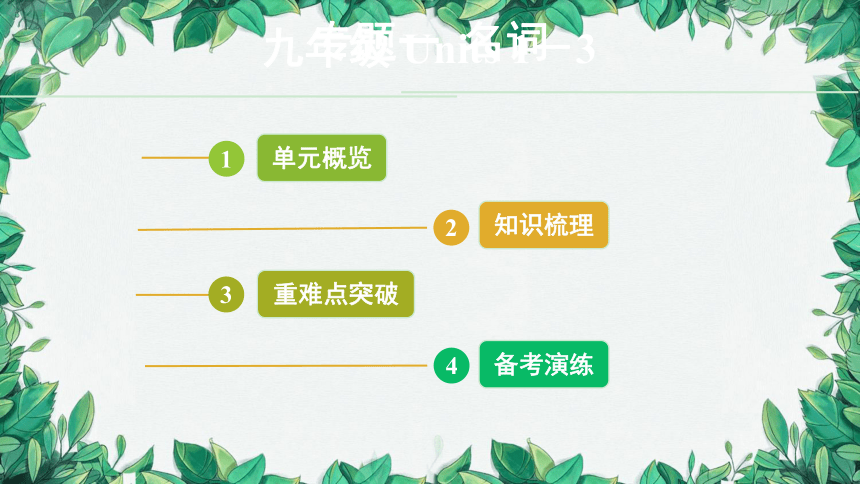
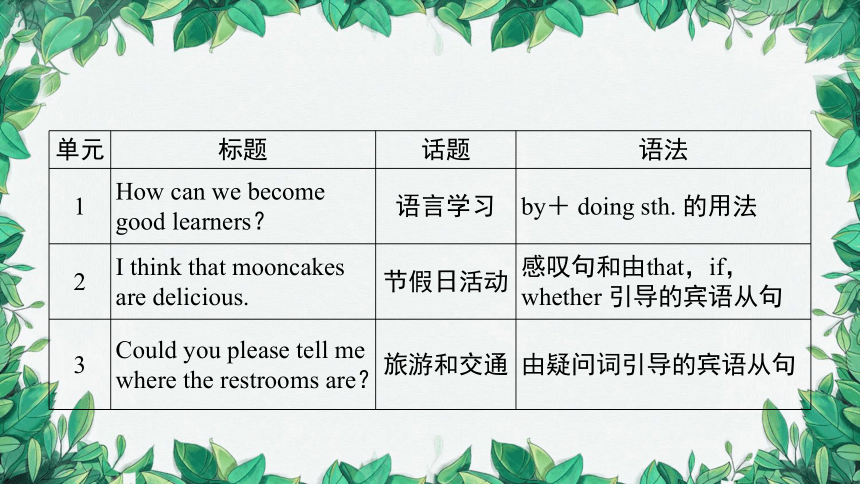
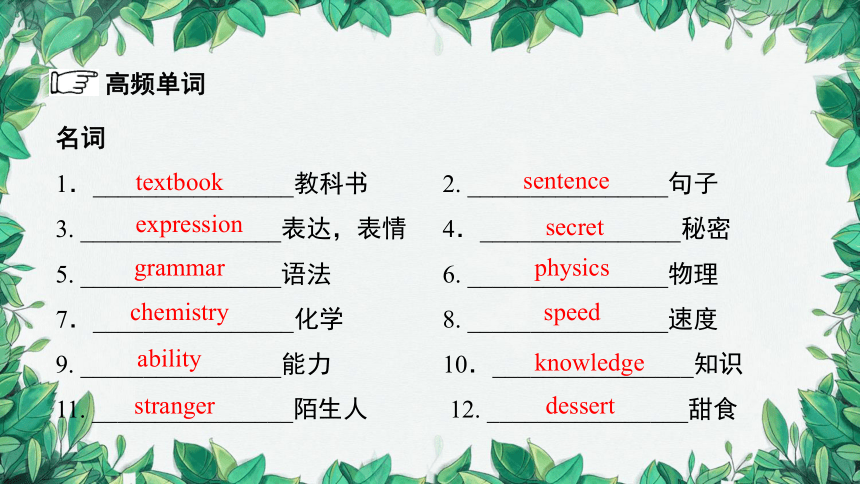
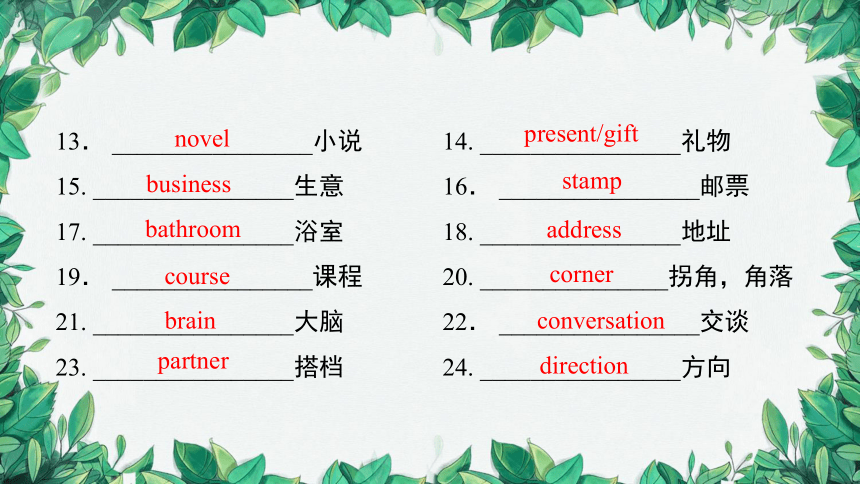
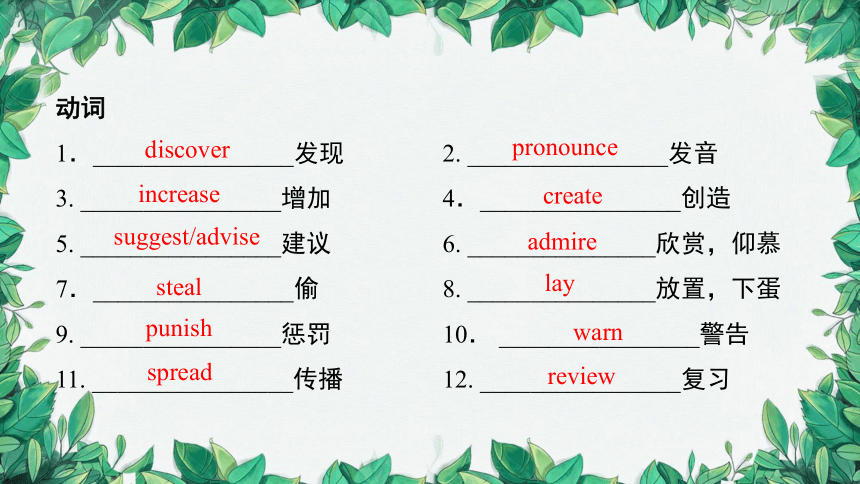
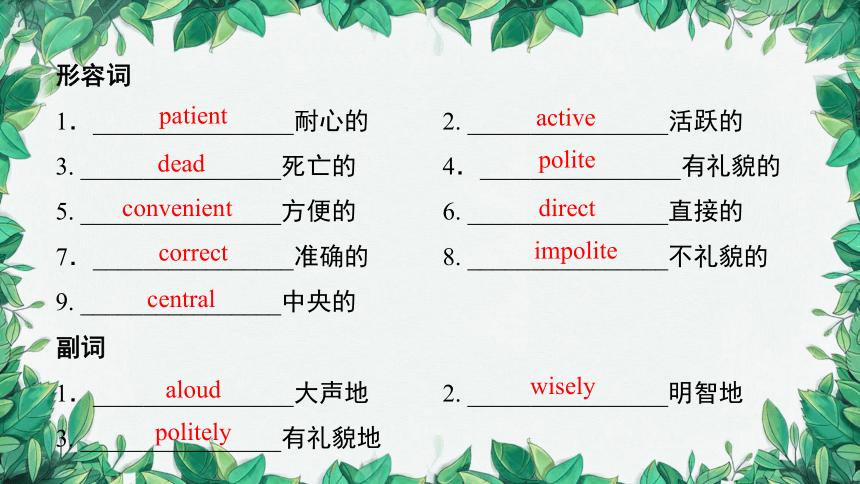
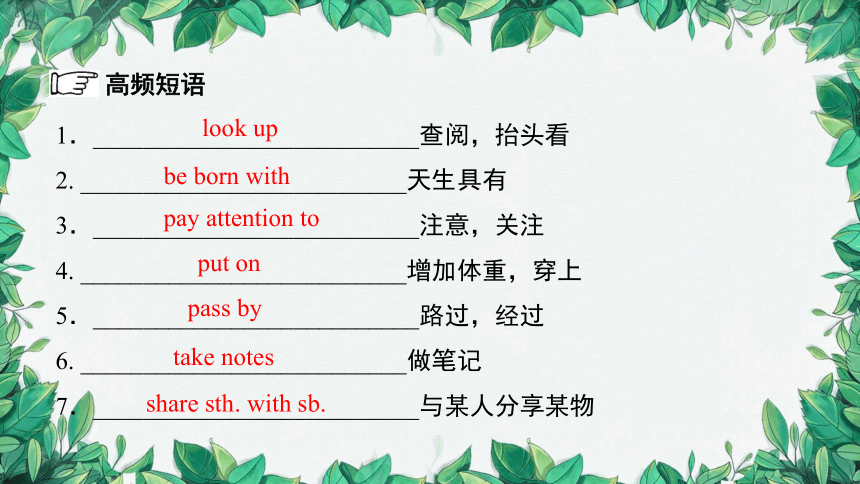
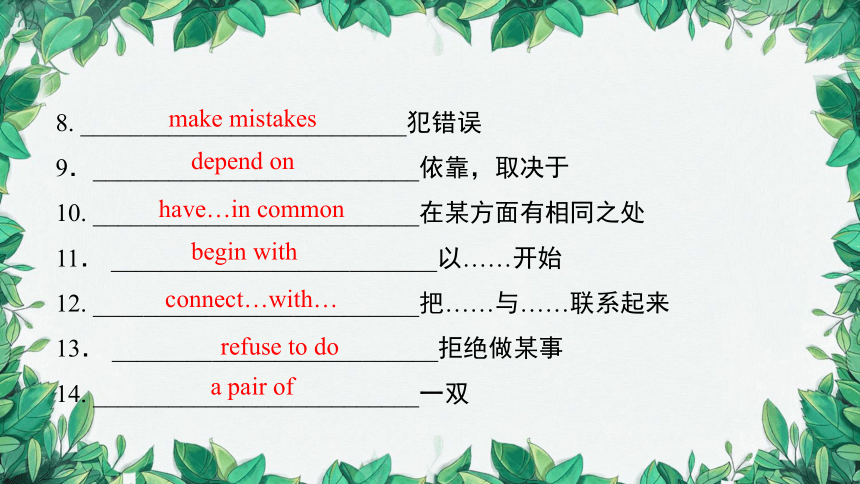
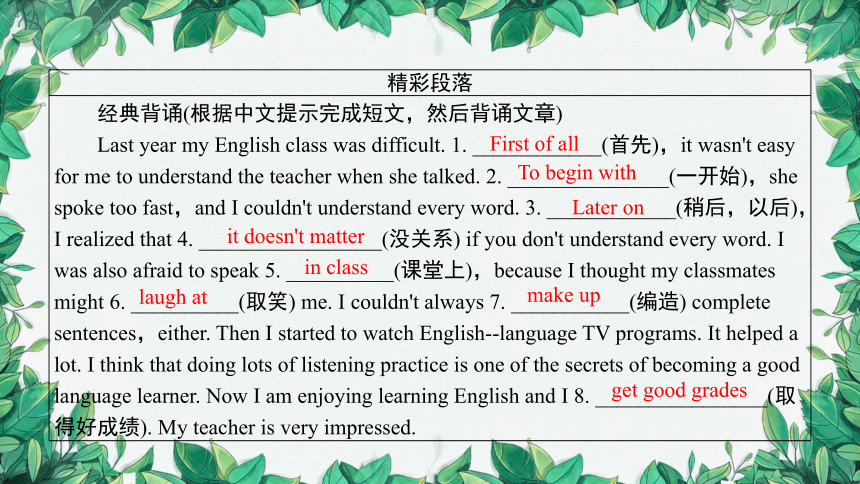

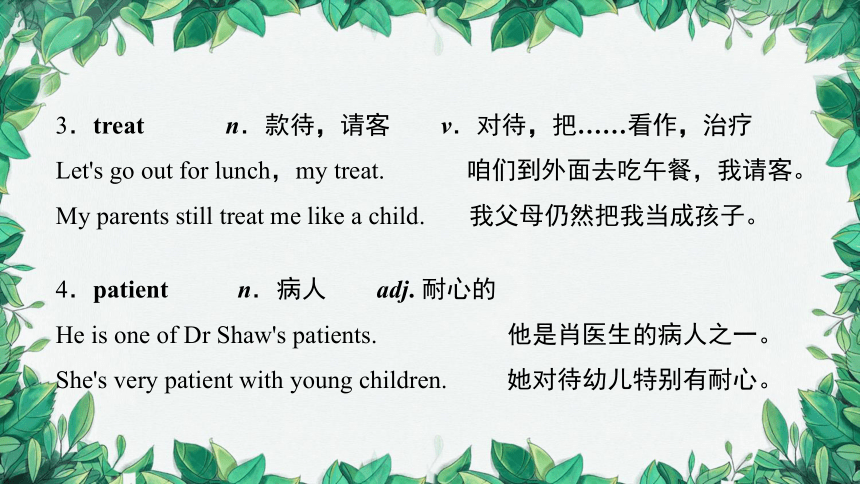
文档简介
(共43张PPT)
教材重难点梳理
专题一 名词
1
单元概览
2
知识梳理
3
重难点突破
4
备考演练
九年级 Units 1-3
单元 标题 话题 语法
1 How can we become good learners? 语言学习 by+ doing sth. 的用法
2 I think that mooncakes are delicious. 节假日活动 感叹句和由that,if,whether 引导的宾语从句
3 Could you please tell me where the restrooms are? 旅游和交通 由疑问词引导的宾语从句
名词
1.________________教科书 2. ________________句子 3. ________________表达,表情 4.________________秘密 5. ________________语法 6. ________________物理
7.________________化学 8. ________________速度
9. ________________能力 10.________________知识
11. ________________陌生人 12. ________________甜食
高频单词
textbook
sentence
expression
secret
grammar
physics
chemistry
speed
ability
knowledge
stranger
dessert
13. ________________小说 14. ________________礼物
15. ________________生意 16. ________________邮票
17. ________________浴室 18. ________________地址
19. ________________课程 20. _______________拐角,角落
21. ________________大脑 22. ________________交谈
23. ________________搭档 24. ________________方向
novel
present/gift
business
stamp
bathroom
address
course
corner
brain
conversation
partner
direction
动词
1.________________发现 2. ________________发音
3. ________________增加 4.________________创造
5. ________________建议 6. _______________欣赏,仰慕
7.________________偷 8. _______________放置,下蛋 9. ________________惩罚 10. ________________警告
11. ________________传播 12. ________________复习
discover
pronounce
increase
create
suggest/advise
admire
steal
lay
punish
warn
spread
review
形容词
1.________________耐心的 2. ________________活跃的
3. ________________死亡的 4.________________有礼貌的
5. ________________方便的 6. ________________直接的
7.________________准确的 8. ________________不礼貌的 9. ________________中央的
副词
1.________________大声地 2. ________________明智地 3. ________________有礼貌地
patient
active
dead
polite
convenient
direct
correct
impolite
central
aloud
wisely
politely
1.__________________________查阅,抬头看
2. __________________________天生具有
3.__________________________注意,关注
4. __________________________增加体重,穿上
5.__________________________路过,经过
6. __________________________做笔记
7.__________________________与某人分享某物
高频短语
look up
be born with
pay attention to
put on
pass by
take notes
share sth. with sb.
8. __________________________犯错误
9.__________________________依靠,取决于
10. __________________________在某方面有相同之处
11. __________________________以……开始
12. __________________________把……与……联系起来
13. __________________________拒绝做某事
14. __________________________一双
make mistakes
depend on
have…in common
begin with
connect…with…
refuse to do
a pair of
精彩段落
经典背诵(根据中文提示完成短文,然后背诵文章)
Last year my English class was difficult. 1. ____________(首先),it wasn't easy for me to understand the teacher when she talked. 2. _______________(一开始),she spoke too fast,and I couldn't understand every word. 3. ____________(稍后,以后),I realized that 4. _________________(没关系) if you don't understand every word. I was also afraid to speak 5. __________(课堂上),because I thought my classmates might 6. __________(取笑) me. I couldn't always 7. ___________(编造) complete sentences,either. Then I started to watch English- language TV programs. It helped a lot. I think that doing lots of listening practice is one of the secrets of becoming a good language learner. Now I am enjoying learning English and I 8. ________________(取得好成绩). My teacher is very impressed.
First of all
To begin with
Later on
it doesn't matter
in class
laugh at
make up
get good grades
1.present n.礼物,现在 adj. 当前的,出席的
Did you get your mother a present 给你母亲买礼物了吗?
There were 200 people present at the meeting at present.
现在有200人出席会议。
一词多义
2.request n.要求,请求 v.要求,请求
They made a request for further aid. 他们要求再给一些帮助。
You can request a free copy of the leaflet. 你可以索要一份免费的宣传单。
3.treat n.款待,请客 v.对待,把……看作,治疗
Let's go out for lunch,my treat. 咱们到外面去吃午餐,我请客。
My parents still treat me like a child. 我父母仍然把我当成孩子。
4.patient n.病人 adj. 耐心的
He is one of Dr Shaw's patients. 他是肖医生的病人之一。
She's very patient with young children. 她对待幼儿特别有耐心。
1.suggest v.建议,暗示,显示——suggestion n.建议——suggest doing sth. 建议做某事
suggest (that) sb. (should) do sth. 建议某人做某事
2.pronounce v.发音——pronunciation n.发音
3.polite adj. 礼貌的 ——impolite adj. 不礼貌的——politely adv. 礼貌地——impolitely adv. 不礼貌地
快乐家族
1.介词by,with,in 的用法
by+名词/动词ing,表示用某种方式、方法、手段或使用某种交通工具。
固定搭配: by the way 顺便一提;by oneself 独自地;by accident 意外地。
with+名词,表示用某种具体、有形的工具或以某物填充、覆盖等。
in+名词,表示用语言材料、语调、笔墨、颜色等。
(1)I learn English ____________________ studying with a group.
(2)Kate cut the apple ____________________ a knife.
(3)Jason filled in the bottle ____________________ water.
(4) The girl ____________________ red is my sister.
by
with
with
in
2.aloud,loud,loudly的用法
aloud:副词,指“出声”,能让人们听见,没有比较级。read aloud 出声朗读;say/cry/laugh aloud 大声地说/喊/大笑。
loud:形容词或副词。作形容词意为“响亮的,大声的”,作副词意为“大声地,高声地”,在talk,speak,sing,laugh 等后面,多用于比较级。
loudly:副词,与loud同义,意为“喧闹地,大声地”,但有打扰别人的意思。
(1)You had better not play ____________________ music. I can't stand it.
(2)Could you please not laugh ____________________ in the room The baby is sleeping.
(3)Speak __________________,please,or they can't hear you clearly.
(4)We often read the text ____________________ in the morning.
loud
loudly
louder
aloud
3.The more you read,the faster you'll be.
“the+比较级,the+比较级”,意思是“越……,就越……”。
I heard that it is becoming more and more popular to celebrate Mother's Day and Father's Day in China.
“比较级+ and +比较级”, 意思是“越来越……”。
(1)The ________________(careful) you are,the _______________(few) mistakes you will make in the exam.
(2)The weather is getting ______________ and ______________(bad) because of the pollution.
more careful
fewer
worse
worse
4.The teacher spoke so quickly that I did not understand her most of the time.
I want to learn new words and more grammar so that I can have a better understanding of English movies.
so…that +从句 意为“如此……以至于……”,引导的是结果状语从句,so后接形容词或副词。
so that +从句 意为“为了,以便”,引导的是目的状语从句。
拓展:too…to +v. 意为“太……而不能……”,too 后可接形容词或副词。
(1)David is ______________ angry _____________ he can't say a word.
=David is _______________ angry _______________ say a word.
(2)Lily was ____________ young ___________ make a speech in public.
=Lily was _______________ young _______________ she can't make a speech in public.
(3)Simon studied hard ____________________ he could pass the exam.
so
that
too
to
too
to
so
that
so that
5.与put有关的短语
put away把……收拾好 put out熄灭,扑灭
put down放下 put on穿上,戴上,增加(体重)
put off推迟,延迟 put up张贴,挂起,搭建
put sth. to good use好好利用某物
(1)The meeting was ____________________ because of the bad weather.
(2)Look! Your desk is in a mess. You should ____________________ your books.
(3)Amy ____________________ 5 pounds last year,because she ate too much junk food.
put off
put away
put on
6.宾语从句
在主从复合句中起宾语作用的从句叫宾语从句。
(1)that 引导的宾语从句。
that引导的宾语从句中that只起连接作用,没有词义,也不在句中充当任何成分,口语中常省略。例如:
He says(that) he won't be free until tomorrow. 他说他直到明天才有空。
(2)whether/if引导的宾语从句。
whether和if都意为“是否”,这类从句一般可以理解为由一般疑问句或选择疑问句句式的直接引语转化而来。例如:
Michael wonders if/whether he has passed the exam.
迈克尔想知道他是否通过了考试。
Harry asked me if/whether this was the right way.
哈里问我这条路对不对。
(3)疑问词引导的宾语从句。
当宾语从句是特殊疑问句时,疑问词就是引导词,从句要用陈述句语序,即:疑问词+主语+谓语+其他。例如:
①Where should we have a meeting
→Could you please tell me where we should have the meeting
②What should I do next
→I wonder what I should do next.
(1)I know ____________________ he will come to attend the meeting.
(2)I wonder ____________________ I should wear a coat for the party.
(3)I don't know ____________________ he can arrive on time or not.
(4)Can you tell me ____________________ he likes to do
that
if/whether
whether
what
7.感叹句
(1)how引导的感叹句。
how作状语,修饰形容词、副词或句子。how引导的感叹句常用以下句式:
How+adj. +a/an +可数名词单数+主语+谓语!
How+adj. /adv. + 主语+谓语!
How+主语+谓语!
如: How lovely a girl she is! 她是多么可爱的一个女孩啊!
How interesting the film is! 这部电影真有趣呀!
How I wish to join the art club! 我多么想加入美术俱乐部呀!
(2)what引导的感叹句。
what作定语,修饰名词,名词前可有形容词或不定冠词。what引导的感叹句常用以下句式:
What+a/an+adj. +可数名词单数+主语+谓语!
What+adj. +可数名词复数+主语+谓语!
What+adj. +不可数名词+主语+谓语!
如:What a great holiday it was! 多棒的假期啊!
What beautiful flowers they are! 多美的花儿啊!
What bad weather it is today! 今天天气真糟糕啊!
(1)____________________ fast the boy ran!
(2)____________________ exciting news it is!
(3)____________________ interesting story it is!
How
What
What an
8.spend,take,cost,pay的区别
spend(spent,spent):意为“花费(时间、金钱或精力)”,主语通常是人,常用的结构:sb. spend(s) time/money on sth;sb. spend(s) time/money(in) doing sth. 意为“某人花费时间或金钱做某事”。
pay(paid,paid):意为“支付,花费”,主语通常是人,常用结构:sb. pay(s) money for sth. 意为“某人为某物付钱”。
cost(cost,cost):意为“花费(金钱)”,主语通常是物,常用结构:sth. cost(s) (sb. ) money意为“某物花费(某人)多少钱”。
take(took,taken):意为“花费(时间)”,it作形式主语,常用结构:it takes sb. some time to do sth. 意为“做某事花费某人多长时间”。
(1)It_____________ me two hours to finish my math homework last night.
(2)The nice dress____________________ her 120 yuan. That is to say she________________ 120 yuan for the dress.
(3)I ___________________ the whole day cleaning my room yesterday.
(4)Would you like to __________________ 30 more dollars on this car
took
cost
paid
spent
spend
9.Why did Wei Fen find it difficult to learn English
此句运用了句型:sb. + finds/found +it+ 形容词+to do sth. ,意为“某人发现做某事……”。
(1)Kate found it difficult ____________________(learn) math well.
(2)I find it interesting for me ____________________(take) a walk with my sister.
to learn
to take
一、完形填空。(建议用时: 6分钟)
A boy was out playing in a field with his friends. As they were playing, the boy __1__ a stone that looked interesting. It was a little bit shining. But it was quite __2__. So the boy picked it up and decided to make it clean.
( )1. A. came across B.came on C.came down D.came from
( )2. A. useless B.small C.hard D.dirty
A
D
His friends made __3__ of him for this. They said, “Why are you polishing(擦亮) that dirty old stone It isn't worth anything at all. ” But every day, when they went out to play, the boy would bring the stone with him, __4__ it whenever they took breaks.
( )3. A. promises B.fun C.advice D.friends
( )4. A. playing B.hiding C.polishing D.using
B
C
This __5__ for some time. Then one day, the boy __6__ his home to join his friends as usual.
When he showed them the stone, they were __7__. It was, in fact, not a common stone after all—it was a beautiful diamond(钻石).
( )5. A. went over B.went away C.went out D.went on
( )6. A. left B.stayed C.finished D.developed
( )7. A. bored B.tired C.moved D.surprised
D
A
D
The boy had stayed up all night the night before, polishing it until it was __8__ clean.
There may be times in your life where people try to discourage(阻碍) you. They may tell you that you're wasting your time on some meaningless __9__. But when they do this, the best thing you can do is to let it be and __10__ to work towards your goal. You can turn a stone into a diamond if you keep working.
( )8. A. especially B.completely C.certainly D.directly
( )9. A. things B.stories C.games D.suggestions
( )10. A. forget B.refuse C.continue D.explain
B
A
C
二、回答问题。(建议用时: 8分钟)
Recently, the result of the national reading survey has come out and it paints a shining future for reading habits in the Internet times. Last year, more than 20,000 people from 55 cities all over China took part in the survey. The survey shows that although the daily reading time and yearly reading number of paper books, printed newspapers and magazines have dropped, digital(数字的) reading has continuously(不断地) increased.
Every day Chinese people use mobile phones, personal computers or iPads for about 100 minutes on average(平均), 15. 5 percent higher than the year before.
According to the survey, Chinese people's reading habits have changed because mobile phones offer people more reading materials to read. More than 50 percent of the Chinese people prefer digital reading, mostly on mobile phones.
Another interesting result is that a lot more people like to listen to audio books(有声读物). More than 30 percent of the people in the survey listen to audio books, higher than the year before. Many people in the countryside drive or take public transport to work for long hours. So they kill their time on the long way by listening to audio books.
In my opinion,the education authorities(教育部门) should pay more attention to people's changing reading habits and shouldn't fall behind.
11.How many people took part in the survey
___________________________________________________________
12.What has continuously increased according to the reading survey
___________________________________________________________
13.Why have Chinese people's reading habits changed
___________________________________________________________
More than 20,000 people(took part in the survey).
Digital reading(has continuously increased).
Because mobile phones offer people more reading materials to read.
14.How do people kill their time on the long way to work
___________________________________________________________
15.Who should pay more attention to people's changing reading habits according to the passage
________________________________________________________________________
By listening to audio books.
The education authorities(should pay more attention to people's changing reading habits).
三、小作文操练。
俗话说,远亲不如近邻。邻里间应该互相帮助,和睦相处。请用4~6句话谈谈你如何与邻居友好相处。内容如下:
1. 遇到邻居要礼貌问候。 2. 尽量帮助有需要的邻居。
3. 积极参加社区活动。 4. 分享喜怒哀乐,促进了解。
_____________________________________________________________________________________________________________________________________________________________________________________________________________________________________________________________________________________________________________________________________________________________________________________________________________________________
As a saying goes,“Close neighbours are better than distant relatives”.How do neighbours get along
First, whenever you meet them, you should say hello to them politely. Second, when they are in need, you should try your best to help them. Third, you can take part in the community activities actively. Last but not least, you can share your happiness and sadness with them and then you will know more about each other.
教材重难点梳理
专题一 名词
1
单元概览
2
知识梳理
3
重难点突破
4
备考演练
九年级 Units 1-3
单元 标题 话题 语法
1 How can we become good learners? 语言学习 by+ doing sth. 的用法
2 I think that mooncakes are delicious. 节假日活动 感叹句和由that,if,whether 引导的宾语从句
3 Could you please tell me where the restrooms are? 旅游和交通 由疑问词引导的宾语从句
名词
1.________________教科书 2. ________________句子 3. ________________表达,表情 4.________________秘密 5. ________________语法 6. ________________物理
7.________________化学 8. ________________速度
9. ________________能力 10.________________知识
11. ________________陌生人 12. ________________甜食
高频单词
textbook
sentence
expression
secret
grammar
physics
chemistry
speed
ability
knowledge
stranger
dessert
13. ________________小说 14. ________________礼物
15. ________________生意 16. ________________邮票
17. ________________浴室 18. ________________地址
19. ________________课程 20. _______________拐角,角落
21. ________________大脑 22. ________________交谈
23. ________________搭档 24. ________________方向
novel
present/gift
business
stamp
bathroom
address
course
corner
brain
conversation
partner
direction
动词
1.________________发现 2. ________________发音
3. ________________增加 4.________________创造
5. ________________建议 6. _______________欣赏,仰慕
7.________________偷 8. _______________放置,下蛋 9. ________________惩罚 10. ________________警告
11. ________________传播 12. ________________复习
discover
pronounce
increase
create
suggest/advise
admire
steal
lay
punish
warn
spread
review
形容词
1.________________耐心的 2. ________________活跃的
3. ________________死亡的 4.________________有礼貌的
5. ________________方便的 6. ________________直接的
7.________________准确的 8. ________________不礼貌的 9. ________________中央的
副词
1.________________大声地 2. ________________明智地 3. ________________有礼貌地
patient
active
dead
polite
convenient
direct
correct
impolite
central
aloud
wisely
politely
1.__________________________查阅,抬头看
2. __________________________天生具有
3.__________________________注意,关注
4. __________________________增加体重,穿上
5.__________________________路过,经过
6. __________________________做笔记
7.__________________________与某人分享某物
高频短语
look up
be born with
pay attention to
put on
pass by
take notes
share sth. with sb.
8. __________________________犯错误
9.__________________________依靠,取决于
10. __________________________在某方面有相同之处
11. __________________________以……开始
12. __________________________把……与……联系起来
13. __________________________拒绝做某事
14. __________________________一双
make mistakes
depend on
have…in common
begin with
connect…with…
refuse to do
a pair of
精彩段落
经典背诵(根据中文提示完成短文,然后背诵文章)
Last year my English class was difficult. 1. ____________(首先),it wasn't easy for me to understand the teacher when she talked. 2. _______________(一开始),she spoke too fast,and I couldn't understand every word. 3. ____________(稍后,以后),I realized that 4. _________________(没关系) if you don't understand every word. I was also afraid to speak 5. __________(课堂上),because I thought my classmates might 6. __________(取笑) me. I couldn't always 7. ___________(编造) complete sentences,either. Then I started to watch English- language TV programs. It helped a lot. I think that doing lots of listening practice is one of the secrets of becoming a good language learner. Now I am enjoying learning English and I 8. ________________(取得好成绩). My teacher is very impressed.
First of all
To begin with
Later on
it doesn't matter
in class
laugh at
make up
get good grades
1.present n.礼物,现在 adj. 当前的,出席的
Did you get your mother a present 给你母亲买礼物了吗?
There were 200 people present at the meeting at present.
现在有200人出席会议。
一词多义
2.request n.要求,请求 v.要求,请求
They made a request for further aid. 他们要求再给一些帮助。
You can request a free copy of the leaflet. 你可以索要一份免费的宣传单。
3.treat n.款待,请客 v.对待,把……看作,治疗
Let's go out for lunch,my treat. 咱们到外面去吃午餐,我请客。
My parents still treat me like a child. 我父母仍然把我当成孩子。
4.patient n.病人 adj. 耐心的
He is one of Dr Shaw's patients. 他是肖医生的病人之一。
She's very patient with young children. 她对待幼儿特别有耐心。
1.suggest v.建议,暗示,显示——suggestion n.建议——suggest doing sth. 建议做某事
suggest (that) sb. (should) do sth. 建议某人做某事
2.pronounce v.发音——pronunciation n.发音
3.polite adj. 礼貌的 ——impolite adj. 不礼貌的——politely adv. 礼貌地——impolitely adv. 不礼貌地
快乐家族
1.介词by,with,in 的用法
by+名词/动词ing,表示用某种方式、方法、手段或使用某种交通工具。
固定搭配: by the way 顺便一提;by oneself 独自地;by accident 意外地。
with+名词,表示用某种具体、有形的工具或以某物填充、覆盖等。
in+名词,表示用语言材料、语调、笔墨、颜色等。
(1)I learn English ____________________ studying with a group.
(2)Kate cut the apple ____________________ a knife.
(3)Jason filled in the bottle ____________________ water.
(4) The girl ____________________ red is my sister.
by
with
with
in
2.aloud,loud,loudly的用法
aloud:副词,指“出声”,能让人们听见,没有比较级。read aloud 出声朗读;say/cry/laugh aloud 大声地说/喊/大笑。
loud:形容词或副词。作形容词意为“响亮的,大声的”,作副词意为“大声地,高声地”,在talk,speak,sing,laugh 等后面,多用于比较级。
loudly:副词,与loud同义,意为“喧闹地,大声地”,但有打扰别人的意思。
(1)You had better not play ____________________ music. I can't stand it.
(2)Could you please not laugh ____________________ in the room The baby is sleeping.
(3)Speak __________________,please,or they can't hear you clearly.
(4)We often read the text ____________________ in the morning.
loud
loudly
louder
aloud
3.The more you read,the faster you'll be.
“the+比较级,the+比较级”,意思是“越……,就越……”。
I heard that it is becoming more and more popular to celebrate Mother's Day and Father's Day in China.
“比较级+ and +比较级”, 意思是“越来越……”。
(1)The ________________(careful) you are,the _______________(few) mistakes you will make in the exam.
(2)The weather is getting ______________ and ______________(bad) because of the pollution.
more careful
fewer
worse
worse
4.The teacher spoke so quickly that I did not understand her most of the time.
I want to learn new words and more grammar so that I can have a better understanding of English movies.
so…that +从句 意为“如此……以至于……”,引导的是结果状语从句,so后接形容词或副词。
so that +从句 意为“为了,以便”,引导的是目的状语从句。
拓展:too…to +v. 意为“太……而不能……”,too 后可接形容词或副词。
(1)David is ______________ angry _____________ he can't say a word.
=David is _______________ angry _______________ say a word.
(2)Lily was ____________ young ___________ make a speech in public.
=Lily was _______________ young _______________ she can't make a speech in public.
(3)Simon studied hard ____________________ he could pass the exam.
so
that
too
to
too
to
so
that
so that
5.与put有关的短语
put away把……收拾好 put out熄灭,扑灭
put down放下 put on穿上,戴上,增加(体重)
put off推迟,延迟 put up张贴,挂起,搭建
put sth. to good use好好利用某物
(1)The meeting was ____________________ because of the bad weather.
(2)Look! Your desk is in a mess. You should ____________________ your books.
(3)Amy ____________________ 5 pounds last year,because she ate too much junk food.
put off
put away
put on
6.宾语从句
在主从复合句中起宾语作用的从句叫宾语从句。
(1)that 引导的宾语从句。
that引导的宾语从句中that只起连接作用,没有词义,也不在句中充当任何成分,口语中常省略。例如:
He says(that) he won't be free until tomorrow. 他说他直到明天才有空。
(2)whether/if引导的宾语从句。
whether和if都意为“是否”,这类从句一般可以理解为由一般疑问句或选择疑问句句式的直接引语转化而来。例如:
Michael wonders if/whether he has passed the exam.
迈克尔想知道他是否通过了考试。
Harry asked me if/whether this was the right way.
哈里问我这条路对不对。
(3)疑问词引导的宾语从句。
当宾语从句是特殊疑问句时,疑问词就是引导词,从句要用陈述句语序,即:疑问词+主语+谓语+其他。例如:
①Where should we have a meeting
→Could you please tell me where we should have the meeting
②What should I do next
→I wonder what I should do next.
(1)I know ____________________ he will come to attend the meeting.
(2)I wonder ____________________ I should wear a coat for the party.
(3)I don't know ____________________ he can arrive on time or not.
(4)Can you tell me ____________________ he likes to do
that
if/whether
whether
what
7.感叹句
(1)how引导的感叹句。
how作状语,修饰形容词、副词或句子。how引导的感叹句常用以下句式:
How+adj. +a/an +可数名词单数+主语+谓语!
How+adj. /adv. + 主语+谓语!
How+主语+谓语!
如: How lovely a girl she is! 她是多么可爱的一个女孩啊!
How interesting the film is! 这部电影真有趣呀!
How I wish to join the art club! 我多么想加入美术俱乐部呀!
(2)what引导的感叹句。
what作定语,修饰名词,名词前可有形容词或不定冠词。what引导的感叹句常用以下句式:
What+a/an+adj. +可数名词单数+主语+谓语!
What+adj. +可数名词复数+主语+谓语!
What+adj. +不可数名词+主语+谓语!
如:What a great holiday it was! 多棒的假期啊!
What beautiful flowers they are! 多美的花儿啊!
What bad weather it is today! 今天天气真糟糕啊!
(1)____________________ fast the boy ran!
(2)____________________ exciting news it is!
(3)____________________ interesting story it is!
How
What
What an
8.spend,take,cost,pay的区别
spend(spent,spent):意为“花费(时间、金钱或精力)”,主语通常是人,常用的结构:sb. spend(s) time/money on sth;sb. spend(s) time/money(in) doing sth. 意为“某人花费时间或金钱做某事”。
pay(paid,paid):意为“支付,花费”,主语通常是人,常用结构:sb. pay(s) money for sth. 意为“某人为某物付钱”。
cost(cost,cost):意为“花费(金钱)”,主语通常是物,常用结构:sth. cost(s) (sb. ) money意为“某物花费(某人)多少钱”。
take(took,taken):意为“花费(时间)”,it作形式主语,常用结构:it takes sb. some time to do sth. 意为“做某事花费某人多长时间”。
(1)It_____________ me two hours to finish my math homework last night.
(2)The nice dress____________________ her 120 yuan. That is to say she________________ 120 yuan for the dress.
(3)I ___________________ the whole day cleaning my room yesterday.
(4)Would you like to __________________ 30 more dollars on this car
took
cost
paid
spent
spend
9.Why did Wei Fen find it difficult to learn English
此句运用了句型:sb. + finds/found +it+ 形容词+to do sth. ,意为“某人发现做某事……”。
(1)Kate found it difficult ____________________(learn) math well.
(2)I find it interesting for me ____________________(take) a walk with my sister.
to learn
to take
一、完形填空。(建议用时: 6分钟)
A boy was out playing in a field with his friends. As they were playing, the boy __1__ a stone that looked interesting. It was a little bit shining. But it was quite __2__. So the boy picked it up and decided to make it clean.
( )1. A. came across B.came on C.came down D.came from
( )2. A. useless B.small C.hard D.dirty
A
D
His friends made __3__ of him for this. They said, “Why are you polishing(擦亮) that dirty old stone It isn't worth anything at all. ” But every day, when they went out to play, the boy would bring the stone with him, __4__ it whenever they took breaks.
( )3. A. promises B.fun C.advice D.friends
( )4. A. playing B.hiding C.polishing D.using
B
C
This __5__ for some time. Then one day, the boy __6__ his home to join his friends as usual.
When he showed them the stone, they were __7__. It was, in fact, not a common stone after all—it was a beautiful diamond(钻石).
( )5. A. went over B.went away C.went out D.went on
( )6. A. left B.stayed C.finished D.developed
( )7. A. bored B.tired C.moved D.surprised
D
A
D
The boy had stayed up all night the night before, polishing it until it was __8__ clean.
There may be times in your life where people try to discourage(阻碍) you. They may tell you that you're wasting your time on some meaningless __9__. But when they do this, the best thing you can do is to let it be and __10__ to work towards your goal. You can turn a stone into a diamond if you keep working.
( )8. A. especially B.completely C.certainly D.directly
( )9. A. things B.stories C.games D.suggestions
( )10. A. forget B.refuse C.continue D.explain
B
A
C
二、回答问题。(建议用时: 8分钟)
Recently, the result of the national reading survey has come out and it paints a shining future for reading habits in the Internet times. Last year, more than 20,000 people from 55 cities all over China took part in the survey. The survey shows that although the daily reading time and yearly reading number of paper books, printed newspapers and magazines have dropped, digital(数字的) reading has continuously(不断地) increased.
Every day Chinese people use mobile phones, personal computers or iPads for about 100 minutes on average(平均), 15. 5 percent higher than the year before.
According to the survey, Chinese people's reading habits have changed because mobile phones offer people more reading materials to read. More than 50 percent of the Chinese people prefer digital reading, mostly on mobile phones.
Another interesting result is that a lot more people like to listen to audio books(有声读物). More than 30 percent of the people in the survey listen to audio books, higher than the year before. Many people in the countryside drive or take public transport to work for long hours. So they kill their time on the long way by listening to audio books.
In my opinion,the education authorities(教育部门) should pay more attention to people's changing reading habits and shouldn't fall behind.
11.How many people took part in the survey
___________________________________________________________
12.What has continuously increased according to the reading survey
___________________________________________________________
13.Why have Chinese people's reading habits changed
___________________________________________________________
More than 20,000 people(took part in the survey).
Digital reading(has continuously increased).
Because mobile phones offer people more reading materials to read.
14.How do people kill their time on the long way to work
___________________________________________________________
15.Who should pay more attention to people's changing reading habits according to the passage
________________________________________________________________________
By listening to audio books.
The education authorities(should pay more attention to people's changing reading habits).
三、小作文操练。
俗话说,远亲不如近邻。邻里间应该互相帮助,和睦相处。请用4~6句话谈谈你如何与邻居友好相处。内容如下:
1. 遇到邻居要礼貌问候。 2. 尽量帮助有需要的邻居。
3. 积极参加社区活动。 4. 分享喜怒哀乐,促进了解。
_____________________________________________________________________________________________________________________________________________________________________________________________________________________________________________________________________________________________________________________________________________________________________________________________________________________________
As a saying goes,“Close neighbours are better than distant relatives”.How do neighbours get along
First, whenever you meet them, you should say hello to them politely. Second, when they are in need, you should try your best to help them. Third, you can take part in the community activities actively. Last but not least, you can share your happiness and sadness with them and then you will know more about each other.
